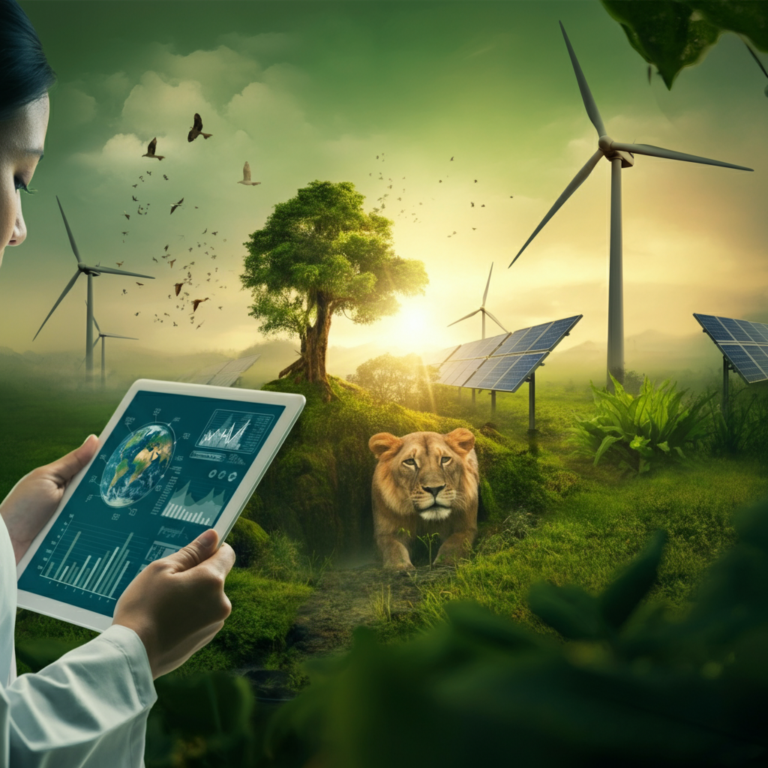Climate change is not just a future threat; it’s a challenge we are living through today. From rising sea levels to more frequent and severe weather events, the evidence of our warming planet surrounds us. Navigating this crisis calls for urgent action, and at the forefront of these efforts is science.
Science plays a critical role in understanding, mitigating, and adapting to climate change. It provides the foundation for data-driven policies, innovative technologies, and global collaboration. This blog will explore the ways in which science contributes to combating climate change and how its breakthroughs can help secure a sustainable future for all.
How Science Helps Us Understand Climate Change
The Evidence of Climate Change
Before solutions can be implemented, it’s essential to diagnose the problem. Science has been instrumental in documenting the evidence of climate change. Through satellites, ice core samples, and climate modeling, researchers have revealed mounting proof of our planet’s warming:
- Rising Global Temperatures: The Earth’s surface temperature has risen by about 1.1°C since the late 19th century, primarily due to increased greenhouse gas emissions.
- Melting Ice Caps: NASA reports that Arctic sea ice is declining at a rate of 12.6% per decade, contributing to rising sea levels.
- Extreme Weather Events: Research connects climate change to more frequent hurricanes, droughts, and heatwaves, disrupting ecosystems and human communities alike.
Predicting the Future with Climate Models
Climate modeling is a powerful tool scientists use to predict the future impacts of climate change. These simulations allow researchers to test various scenarios, from continuing with current carbon emissions to adopting aggressive interventions. By providing policymakers with forecasts, climate models ensure that decisions are informed and proactive.
Scientific Innovation in Reducing Carbon Footprints
Renewable Energy Technologies
Energy production is one of the largest contributors to greenhouse gas emissions, and science is leading the transition to cleaner alternatives. Innovations in renewable energy sources such as wind, solar, and geothermal are rapidly advancing in efficiency and affordability. For instance:
- Solar Power: Advances in photovoltaic technology have significantly driven down costs, making solar one of the fastest-growing energy solutions.
- Wind Power: Turbine designs have evolved to capture more energy, even in low-wind conditions.
- Energy Storage: Breakthroughs in battery technology are helping to store renewable energy for use when the sun isn’t shining or the wind isn’t blowing.
Carbon Capture and Storage (CCS)
Another critical area of research is carbon capture and storage, which involves trapping carbon dioxide emissions before they enter the atmosphere and storing them underground. This technology has the potential to reduce emissions from industries that are currently difficult to decarbonize, such as cement and steel production.
Greener Transportation
Transportation is another major source of emissions, and science has paved the way for cleaner solutions:
- Electric Vehicles (EVs): Advances in battery technology have increased EV range and reduced costs, encouraging wider adoption.
- Hydrogen Fuel Cells: Hydrogen-powered vehicles are emerging as a zero-emission alternative, particularly for heavy-duty transport.
- Sustainable Aviation Fuels (SAFs): Researchers are developing biofuels that can significantly reduce the aviation industry’s carbon footprint.
Harnessing Science for Climate Adaptation
While reducing emissions is critical, adapting to the inevitable impacts of climate change is equally important. Science helps us build resilience in vulnerable areas:
Predicting and Preparing for Natural Disasters
Improved weather prediction models allow scientists to provide advance warnings for hurricanes, floods, and wildfires. These systems save lives by giving communities time to prepare and evacuate.
Climate-Resilient Agriculture
With changing rainfall patterns threatening global food security, researchers are developing crops that can withstand extreme conditions, such as drought-resistant wheat and flood-tolerant rice.
Urban Adaptation Strategies
Cities are implementing science-driven solutions like green roofs, urban forests, and improved flood defenses to combat heat and manage rising water levels. These approaches not only protect infrastructure but also improve quality of life for residents.
The Power of Global Collaboration in Climate Science
Climate change is a global issue, and fighting it requires international collaboration. Scientific organizations and governments worldwide are coming together to share research, resources, and technologies. Examples of this include:
- The Intergovernmental Panel on Climate Change (IPCC), which synthesizes climate science from around the globe to guide policy decisions.
- The Paris Agreement, a landmark international treaty where countries commit to limiting global warming to well below 2°C.
These collaborative efforts underscore the interconnected role of science and diplomacy in addressing climate change.
How You Can Support Science in the Fight Against Climate Change
While science provides us with the tools to combat climate change, the collective will of individuals, businesses, and governments is essential to turn knowledge into action. Here are some ways you can contribute:
- Stay informed: Follow credible sources of climate science to understand the challenges and solutions.
- Support sustainable practices in your daily life, such as reducing waste, conserving energy, and choosing eco-friendly products.
- Advocate for change by supporting policies and leaders committed to climate action.
- Invest in innovation if you’re a business—look into adopting renewable energy, improving energy efficiency, and reducing your carbon footprint.
Every Step Forward is a Step Toward a Sustainable Future
Science has always been a force for progress, and in the fight against climate change, it is our greatest ally. From understanding the problem to creating innovative solutions and adapting to a changing world, science provides the roadmap to a sustainable future.
The challenge is significant, but the tools are within reach. By supporting scientific research, fostering innovation, and making climate-conscious decisions in our daily lives, we can all play a part in combating this global crisis.
Together, guided by science, we have the power to secure a healthier planet for generations to come.





















0 Comments